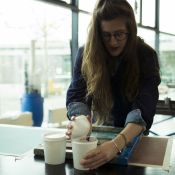




A friendly, creative and welcoming community

Having visited Falmouth a few times before coming to Falmouth University, I knew that I loved the town. There is such a friendly, creative and welcoming community at both the University and in Falmouth, it was an easy choice.
WHAT IS THE MOST DIFFICULT THING ABOUT BEING AN INTERNATIONAL STUDENT?
Because I lived in England before coming to Falmouth, I haven’t missed home any more than usual. I’m just really excited to be here!
HOW HAVE YOU FOUND THE COURSE?
In just the first 2 months of my course, I have learned so much - not just about textiles but about how I work and develop ideas. Even though it has been a lot of information and work in a short space of time, I’ve felt excited about the new opportunities to create. The tutors and technicians have been so helpful, supportive and motivating right from the beginning.
THE ACADEMIC SCHOOL?
The library has been the most lovely resource. It is all too easy to get lost exploring the journal collections!
WHAT SOCIAL ACTIVITIES DO YOU ENJOY?
My friends and I have started a Sunday night dinner club. The discussion is usually focused on everyone’s course work, and it’s nice to hear about other courses. In the end, we are all influenced by each other.
WHAT’S THE BEST THING ABOUT LIVING IN FALMOUTH?
Being next to the sea. I love being able to walk to the beach whenever I please, it’s such a treat!
WHAT WILL YOU MISS MOST ABOUT FALMOUTH?
The friendly and welcoming atmosphere - of the town and the university.
HAS THE UNIVERSITY BEEN SUPPORTIVE?
Yes. The international office has been so helpful and lovely. When I was sorting out my visa from Canada, they helped me fill out forms and were there to answer any questions that I had (there were quite a few).
THE FUTURE?
Now that I’m here, I don’t want to leave! I’d love to go onto an MA after this.
- Emily

Encouraging and helpful

Not many places offer something as specific as Performance Sportswear Design. I spoke to two alumni who share the same passion as me in football kits. They have great things to say about the course. I also exchanged emails with Patrick Gottelier and it was great to see that he was personally interested in my story. The International Team was very helpful in answering all my questions and made it a much easier decision.
THE MOST DIFFICULT THING ABOUT BEING AN INTERNATIONAL STUDENT?
The cost of the course as well as the living cost. I wish there were more scholarships and bursaries available for international students.
HOW HAVE YOU FOUND THE COURSE?
I love it. They are doing a great job in convincing us to be brave and to try new things in our 90 weeks here. I like the fact that in the first year, we are working with Fashion Design students as we can learn a lot from each other.
THE ACADEMIC SCHOOL...
Everyone is so friendly here. Both campuses are great. Falmouth/Woodlane is very charming. I only wished it was opened till later like Tremough/Penryn. Tremough/Penryn has very modern facilities. The library and IT suite are pretty good too!
INVOLVED WITH ANY CLUBS AND SOCIETIES?
I play on two FXU teams, badminton and tennis. I am also an avid participant in many of the International Society Events.
WHAT SOCIAL ACTIVITIES DO YOU ENJOY?
I enjoy conversations over dinner or quiet drinks. Playing sports is a big deal for me too. On top of the FXU societies, I also play volleyball for the Cornish Saracens in a local league.
WHAT'S THE BEST THING ABOUT LIVING IN FALMOUTH?
Falmouth is a great little town. Even though I don’t do any water sports, I enjoy being close to the water. I think being far away from a big city allows students to really focus on learning.
WHAT WILL YOU MISS MOST ABOUT FALMOUTH WHEN YOU LEAVE?
I will miss the daily uphill walks everywhere. I am not joking!
HAS THE UNIVERSITY BEEN SUPPORTIVE DURING YOUR TIME HERE?
I haven’t really needed the support from any of the support groups available. Though the tutors/staff have been extremely supportive, the same goes for the staff in the academic office and the International office.
WHAT ADVICE WOULD YOU GIVE TO STUDENTS PLANNING ON COMING TO FALMOUTH?
I’d tell them to come! But if they are in doubt, join one of the Facebook groups of the courses they want to get into and speak to students who are currently doing the course. Reach out to alumni via various forms of social media. And if it’s possible, come visit the campus. I didn’t see the school before I came, but via the website and other channels, I was already able to make my decision to come down here. Also, I’d advise students to find out which campus they will be studying at.
THE FUTURE?
I want to design football kits and all types of sportswear. I would like to work in the UK or Europe. I am confident my Falmouth education and experience will take me places!
- Christer

Falmouth is my home away from home

While on my hunt in finding the most suitable foundation course for me, I carried a mental checklist of must-haves for the university I would end up attending. The student work had to be really good, as it’s a reflection of not only the students but of the teachers educating them. The location had to be nowhere close to home! My wanderlust forbade that so my search led me to solely attend schools overseas. Most importantly, I had to be able to imagine myself taking away the experience I desired in my first year, academically, socially, environmentally, and Falmouth was it.
THE MOST DIFFICULT THING ABOUT BEING AN INTERNATIONAL STUDENT?
I would probably have to say the currency exchange! I’m used to it now, but it is a bit annoying every now and then. Also, not being able to just hop on a train home for the weekend like some of my friends who actually live in this country. It's not as if I can just take a day's worth of travel to go back home for less than three days anytime I wanted!
HOW HAVE YOU FOUND THE COURSE?
It’s VERY challenging. At first, like any other student, you are like, "I can handle whatever they throw at me?" But once procrastination kicks in and your first assessment is right around the corner, you realize how much work and time you have left before then! For me, though, I like a good challenge.
THE ACADEMIC SCHOOL
I absolutely love the library! The resources are very useful. I’m not entirely into books, but I’ve gotten into the habit of going to the library and not leaving without one or several! Also, the lectures are informative when it comes to the many layers of art history and how it has influenced modern and past artists.
INVOLVED WITH ANY CLUBS AND SOCIETIES?
When it comes to clubs and societies, I’m very indecisive because there are so many interesting ones that I want to join, but it’s difficult to pick.
WHAT SOCIAL ACTIVITIES DO YOU ENJOY?
I’ve been exploring the many nooks and crannies of Falmouth and other nearby areas with my friends. That's not enough for me though. I plan on hopping on the train soon to see as much as I can before the year is over. At the same time, I have to balance out my work schedule so I can go as I please.
WHAT'S THE BEST THING ABOUT LIVING IN FALMOUTH?
It would definitely have to be the fact that I live right by the ocean and just the array of people you find here.
WHAT WILL YOU MISS MOST ABOUT FALMOUTH WHEN YOU LEAVE?
I will definitely miss the people I’ve met, from seeing them every day to not at all will be very unusual for me because I’m already so adjusted to life here. The scene as a whole I will miss dearly because I’m in a mindset at the moment where I feel that Falmouth is my home from home.
HAS THE UNIVERSITY BEEN SUPPORTIVE DURING YOUR TIME HERE?
Very supportive, especially as an international student coming into a new country and trying my best to adjust to the culture. Any problems or concerns I’ve had have been resolved and figured out with help from the international office, tutors and the list goes on!
WHAT ADVICE WOULD YOU GIVE TO STUDENTS PLANNING ON COMING TO FALMOUTH?
Make sure this is what you want! When you start your journey into higher education, you're investing so much time and money into it, so don’t let such an experience go to waste. Especially when it comes to actually being on the course, don’t procrastinate too much because it will come back to haunt you in the end if you don’t obtain the results you want.
THE FUTURE?
At the moment, I’m doing massive research into what I want to do with my life for the next year or so. There are so many things I’m interested in and would love to do, but I need to discover what really suits me and my passion. I do plan on continuing my travels either into other parts of Europe or just seeing more of England as a whole.
- Carmela

Amazing

I was born and raised in the United States, in a town that I never had the chance to leave. The idea of traveling was always something that I yearned for, but couldn’t quite figure out how to do. In high school, I learned about doing my studies abroad, being able to do my studies in London gave me the chance to finally fulfill a dream while also getting a degree. When I visited London, I toured three London universities and Roehampton just felt right. As someone who never lived in another country, let alone a big city before, a campus felt like the right choice, I could be in London and still have a community right outside my door. Having a campus took away from the stress of having to find my classes, a social life, and other necessary resources, while 3000 miles away from home. The other reason I chose Roehampton was the beautiful, natural landscapes surrounding parts of the university which gave it the perfect balance between urban and natural landscapes.
WHAT DO YOU ENJOY MOST ABOUT THE UNIVERSITY?
For me, the best part of university has been the independence I gained and what came with that. Living on my own, buying my own food, and just making my own decisions was an essential part of my character growth in the past two years. I am a much more confident person in so many ways and much happier and more content with what I am doing in life.
WHAT TOPICS HAVE YOU FOUND INTERESTING/EXCITING SO FAR?
As a photography student, the two main topics that were the most exciting for me were learning how to use film and analog cameras and having access to a ton of art theory. In both of these categories, the main reason for my interest is the fact they gave me inspiration and helped me to develop as an artist. Film photography forced me to take a hands-on approach to my work that digital photography does not always let you do, and having access to art theory of all kinds fuelled my love for learning about Art.
WHAT IS THE BEST ASPECT OF YOUR DEGREE?
The Art Theory aspect of my course has been by far the greatest part of my degree. When applying to universities I knew I did not want to just learn how to use the equipment, I also wanted to learn about all the people and things that have influenced photography as an art. Having a heavy theory-based course was very important to me and the lecturers at Roehampton have fulfilled that. Every lecturer has a very in-depth understanding of art theory, and their personal influencers all vary so there is a wide range of artists, philosophers, etc. they will recommend, and the library does contain all the books needed and more.
CAN YOU TELL ME ABOUT ANY ACTIVITIES/PROJECTS/FIELD TRIPS YOU HAVE BEEN INVOLVED IN THROUGH YOUR DEGREE?
Since photography is a visual medium, there is a ton of practical work that goes on into our first and second years. We take trips to museums, like the Tate and The Photographers’ Gallery. We also work outside constantly and are encouraged during practical classes like Advanced Skills to shoot on campus with different types of cameras. Lastly, as a third-year, I am lucky enough to be able to take part in a gallery exhibition in Brixton put together with the help of the university and other 3rd years called “Free Range”.
WHAT WOULD YOU LIKE TO DO AFTER YOU HAVE GRADUATED?
Currently, I am applying to master's programs and looking to continue my studies in the Fine Arts. I am also working on becoming a working artist by getting my name out as a photographer and working on a photo book that I hope to submit to different photography exhibitions and competitions. My main goal has always been to figure out how to be a working artist in some way, shape, or form, and while my journey is far from over Roehampton has been an amazing part of it.
WHAT SUPPORT HAVE YOU BEEN GIVEN AS AN INTERNATIONAL STUDENT?
As one could imagine moving away to university is difficult, but there is even more difficulty that comes with going a whole ocean away. Roehampton was there to help me from the beginning processes, getting my visa, enrolling, understanding UCAS, etc. Another thing I have been supported well with is the medical center and mental health counseling on campus, which is open the same way to international students as it is to UK citizens. University is stressful for anyone and I have found that Roehampton offers a wide range of support when the stress becomes too much. It is a university that is there for every student and creates unique support for everyone.
AS AN INTERNATIONAL STUDENT, WHAT HAVE YOU ENJOYED ABOUT YOUR TIME AT ROEHAMPTON?
Roehampton has been an amazing time overall, the community is something that I really enjoy, even though it’s a big university, you don’t feel like a small fish in a big pond. The community is tight-knit and there are so many things to get involved in, societies to join, sports to try, there’s constantly something happening. Coming from so far away to a totally new country I was afraid I would not make friends, I was worried I would be very lonely, but at Roehampton, it almost seems impossible to not find friends.
As someone who had never lived in a big city, let alone another country, a campus was the right choice as I could be in London and still have a community outside my door. Roehampton helped me throughout the process, from understanding UCAS and enrolling, to getting my visa. Coming from so far away I was afraid I would not make friends and would be very lonely, but at Roehampton, it almost seems impossible to not find friends.
- Emma

I made so many friends!

This course is for you if you love being creative and are willing to learn whatever is thrown at you.
HOW DID SOLENT PREPARE YOU FOR YOUR CAREER?
University has allowed me to learn all different aspects of graphic design for fashion, as well as new software I never knew existed before starting my university life. I have now got a bag full of skills in more areas than I could have imagined. These skills have enabled me to stand out from the crowd to employers.
FAVORITE SOLENT MEMORY?
I have lots, but I loved living in halls in my first year and making so many friends.
WHAT IS FASHION GRAPHICS?
Fashion graphics is a mixture of graphic design and fashion design, with elements of art and illustration.
WHAT’S YOUR CAREER HIGHLIGHT SO FAR?
Having my design sold on ASOS is my highlight so far – it was really surreal. I have been lucky enough to work with big brands before I even graduated. It made me think, if I can do this, I can aim for anything.
WHAT’S NEXT FOR YOU?
I am now freelancing while I prepare for my full-time job, working for a jersey supplier company in London that supplies designed clothing to Topshop, Urban Outfitters, and Miss Selfridge, to name a few. My role is to create and draw designs (graphics) and shapes ready to be sent to the factories for samples. Usually, a buyer sends over the information they want and we make the magic happen.
WHAT TIPS WOULD YOU GIVE TO SOMEONE WANTING A CAREER IN THIS AREA?
Be passionate and be willing to learn things that may not be directed at where you think you want to go. I had an open mind, going in wanting to be an editorial designer for a magazine, but I came out the other end skilled in lots of other areas, mainly wanting to pursue a career in print design.
- Sophie


